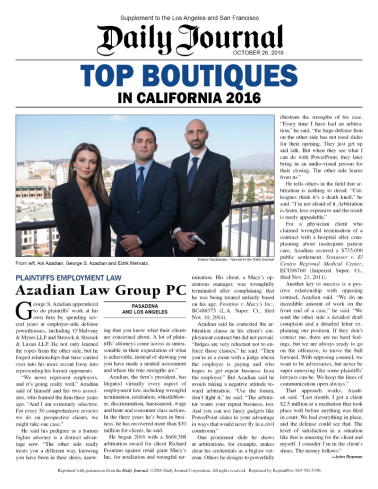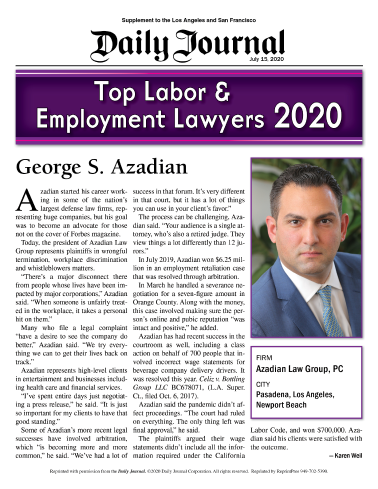Los Angeles Discrimination & Harassment Lawyer
Discrimination Attorney in Los Angeles, CA
Azadian Law Group, PC regularly represents clients throughout Los Angeles, CA, who are the victims of discrimination or harassment in the workplace.
Even in the “modern age,” discrimination and harassment against employees still regularly occur in the workplace. Our Los Angeles Discrimination Attorneys understand how discrimination and harassment impact the lives of employees, often making the jobs they once loved into an everyday nightmare. Many employees face discrimination and harassment for some time before they are terminated or forced to resign. The experienced discrimination lawyers at Azadian Law Group, PC, fight employers aggressively to ensure they secure the maximum recovery for victims of discrimination and harassment.
The award-winning Los Angeles employment lawyers at the Azadian Law Group are dedicated to protecting employee rights and have successfully represented healthcare professionals, financial executives, and various other employees in discrimination and harassment lawsuits. Mr. Azadian has recovered over $100 Million for his clients. He is highly regarded as among the best Los Angeles employment law lawyers & wrongful termination lawyers. His philosophy to employment litigation is that you have been both very reasonable and extremely aggressive. “I simply won’t stop until I get my client a good result. These corporations have put these employees and executives through so much that I am thrilled to give them back their power and voice.”
We strongly believe in the saying, “Jack of all trades, master of none.” Therefore, we exclusively represent plaintiffs in labor & employment lawsuits. By focusing our practice, we can offer our clients in-depth expert knowledge possessed by few others in the industry. Our verdicts and settlements make us a real threat from the start of the case and provide our clients with maximum value for their claims. Compare our results to others; you will see that we have a track record of proven success.

Different Types of Discrimination or Harassment in Los Angeles, California
Many people falsely believe that because it is the 21st century, workplace discrimination and harassment no longer occur. But as we at the Azadian Law Group, PC find daily, discrimination can – and does – happen, and it can present itself in many different forms, including:
Please click on a topic for more information
- Age Discrimination – This is when an employee who is 40 years of age or older is treated unfavorably in comparison to significantly younger employees. Discrimination of this sort could result in not being hired for a position with equal qualifications among older and younger candidates, being overlooked for a promotion, being wrongfully terminated, or even through verbal harassment.
- Disability Discrimination is when an employee is discriminated against by not being hired, promoted, or compensated appropriately due to a medical condition or a disability but is equally qualified and able to perform day-to-day tasks.
- Gender Discrimination – This is when an individual is the target of abuse in the form of sexism. This often affects women as they are notoriously paid pennies to the dollar in comparison to their male counterparts for performing equally in their positions.
- Pregnancy discrimination is a related form of gender discrimination and can take on many forms. This could occur when the employer violates a woman’s right to be reinstated after taking pregnancy leave, being terminated after it is discovered the employee is pregnant, or even not being promoted into a position they are equally qualified for due to pregnancy.
- Denial of Medical Leave – Wrongfully denied medical leave or even facing the consequences for having taken leave for medical reasons when employers are legally required to offer CFRA/FMLA leave for eligible employees who face an injury or medical disability.
- Harassment – This can occur in the workplace in the form of unwanted and inappropriate sexual advances or verbal or physical harassment aimed at employees due to their ethnicity, sex (and pregnancy), religion, or disability.
- Race/Color or National Origin Discrimination – This may be when an employee is subjected to regular offensive comments regarding ethnicity, not being compensated equally, or otherwise treated less favorably due to their race, nationality, or skin color.
- Religion Discrimination – This is when an employee is treated differently because of his or her religious or non-religious beliefs by way of not being treated equally by the employers or being constantly verbally harassed.
Retaliation Against An Employee Who Complains About Discrimination Or Harassment Is Against The Law
Employees who complain about discrimination or harassment in the workplace cannot be retaliated against due to their complaints. Sometimes, employees make these complaints directly to their supervisors or human resources. While it is a good idea to generally make these complaints in writing after speaking with an employment lawyer, the law protects complaints that, as a whole, appear to oppose illegal discrimination regardless of whether specific terms are used. See Castro-Ramirez v. Dependable Highway Express, Inc., 2 Cal. App. 5th 1028, 1046-47 (2016) (“An employee is not required to use legal terms or buzzwords when opposing discrimination. The court will find opposing activity if the employee’s comments, when reading in their totality, oppose discrimination. . . . FEHA does not protect only the impudent or articulate.”)
Such retaliation is often proven by the fact that the employee is terminated shortly after he or she complains. See Scotch v. Art Inst. of California-Orange County, Inc., 173 Cal. App. 4th 986, 1020 (2009) (“Close proximity in time of an adverse action . . . is often strong evidence of a retaliatory motive.”); see also Morgan v. Regents of Univ. of Cal., 88 Cal. App. 4th 52, 69-70 (2000) (“The retaliatory [or discriminatory] motive is proved by showing that Plaintiff engaged in protected activities, that his employer was aware of the protected activities, and that the adverse action followed within a relatively short time thereafter.”)
What to Do If You Have Been Discriminated Against in California?
Discrimination is often very subtle in today’s work environment but can be proven. If you believe that you have been the target of discrimination at work, you should first speak with an employment attorney at the Azadian Law Group, PC. Our team of accomplished employment law attorneys will walk you through the information you need to document to prove your case and protect you from harm.
During our consultation, we will also advise you of all and any documentation you have that will help prove that you have been discriminated against. This may include performance reviews, communications regarding requests for medical leave, and complaints about unfair treatment or violations of equal rights in the workplace.
We first attempt to determine why the employer had it out for you and whether that motive was illegal. We then attack the employer’s stated reason for your termination. By showing the employer’s reasons to be false or weak, we show that the real reason for the action against you was illegal discrimination. See Hersant v. Department of Social Services, 57 Cal. App. 4th 997, 1005 (1997) (retaliation and discrimination may be proved by “weaknesses, implausibilities, inconsistencies, incoherencies, or contradictions in the proffered legitimate reasons” for the employee’s termination).
We also analyze potential employment cases to determine if the employer singled you out for an illegal reason while not treating other employees equally. For example, were you terminated for something that other employees get away with? See Wills v. Superior Court, 194 Cal. App. 4th 312, 340 (2011) (“Showing disparate treatment or policy enforcement is a permissible means to establish pretext. . . . To establish pretext in this manner, [plaintiff] must identify other similarly situated employees the [defendant] did not terminate.”).
Another factor to consider in proving discrimination and harassment is if other employees were mistreated based on the same protected characteristic. For example, were other older employees forced out? Were other disabled employees discriminated against? Were other employees of that same race or religion also treated poorly? Did the manager sexually harass other employees? This concept in employment law is called “me-too” evidence because these other employees also claim they were mistreated for the same illegal reason. See Pantoja v. Anton, 198 Cal. App. 4th 87, 115 (2011) (reversing defense verdict and holding that “the trial court abused its discretion when it excluded the me-too evidence” despite the fact that the “‘me too’ evidence related to harassing activity that occurred outside the plaintiff’s presence and at times other than when the plaintiff was employed”); see also Johnson v. United Cerebral Palsy/Spastic Children’s Found., 173 Cal. App. 4th 740, 759 (2009) (“The challenged ‘me too’ declarations that plaintiff included in her opposition to defendant’s motion for summary judgment constitute substantial evidence requiring reversal of the judgment”); Josephs v. Pacific Bell, 443 F.3d 1050, 1064-65 (9th Cir. 2006) (earlier grievance proceedings involving similarly situated employees admissible in discrimination action); Obrey v. Johnson, 400 F.3d 691, 697 (9th Cir. 2005) (holding that the district court abused its discretion when it excluded testimony of three other employees “who were prepared to testify that the [defendant] discriminated against them based on race”).
If the termination occurred after an investigation, we also analyze whether that investigation was conducted in good faith, including giving you a chance to respond to the allegations against you. See Reeves v. Safeway Stores, 121 Cal. App. 4th 95, 119 (2004) (former employee’s evidence “raised triable issues as to the existence and effect of retaliatory motive on the part of the supervisor, and as to whether the manager and the intermediate investigator acted as tools . . . [causing] to plaintiff’s injury. . . . The evidence supports an inference that the investigation of the alleged misconduct was not truly independent but was heavily skewed” against the employee.); Cotran v. Rollins Hudig Hall Int’l, 17 Cal. 4th 93, 93-96 (1998) (“The better-reasoned view, we conclude, prescribes the jury’s role as deciding whether the employer acted with a fair and honest cause or reason, regulated by good faith.”).
You can find a helpful brochure from the California Department of Fair Employment and Housing regarding your rights as an employee to work in an environment free from judgment and intolerance here. You can also learn what questions an employer cannot ask during an interview by clicking here.
Disparate Treatment Vs. Disparate Impact In Los Angeles Workplace Discrimination Cases
Workplace discrimination can be divided into two general categories: disparate treatment and disparate impact.
Disparate treatment is often the more obvious of the two. It consists of any form of discrimination in which an employee is intentionally treated differently than others based on their membership in a protected class.
Disparate impact forms of workplace discrimination may be less overt. Sometimes, they may also be unintentional. Regardless, the United States Supreme Court long ago established a precedent ensuring victims of disparate impact workplace discrimination still have the right to take legal action. Title VII of the 1964 Civil Rights Act also outlaws disparate impact discrimination. Various other state laws and past court decisions reinforce
Los Angeles Discrimination 101: What You Need To Know About Disparate Impact Discrimination?
Disparate impact discrimination occurs when a workplace policy or standard disproportionately has a negative impact on members of a certain group. The case that provides us with our current understanding of disparate impact discrimination, Griggs v. Duke Power Co., involved Black employees of Duke Power’s Dan River Steam Station, recognizing that certain policies of their employer negatively influenced their ability to increase their wages.
Employees of Duke Power’s Dan River Steam Station generally worked in one of five departments. “Labor” was the department that paid the least. In fact, the highest-paying job in the Labor Department still paid less than the lowest-paying position in any of the other departments.
The company imposed certain requirements for working in a department other than Labor. One such requirement was having earned a high school diploma.
Given the historical context of this case, many of the Black workers at the company had not completed high school and thus were unable to work in any department other than Labor. Had the requirement of earning a high school diploma actually had a relevant bearing on whether a worker could perform the duties required of them in a job outside of the Labor Department, it may have been an acceptable policy. Disparate discrimination doesn’t occur simply when companies establish employment requirements that serve genuine business purposes.
In this instance, though, the plaintiffs were able to demonstrate to the US Supreme Court that, while company policies regarding working outside of the Labor department had a disproportionately negative impact on Black workers, they weren’t necessary policies, as many of the jobs in other departments could be filled by someone who didn’t possess all the “qualifications” the employer required.
Unfortunately, disparate impact discrimination still happens in workplaces. It often goes unreported because proving a company policy that negatively impacts members of a certain group is an unnecessary policy is more challenging than proving someone has been the victim of intentional and targeted discrimination.
This isn’t meant to discourage you from taking action if you believe you’ve been the victim of disparate impact discrimination. It’s meant to encourage you to enlist the help of a qualified Los Angeles discrimination attorney. Building a strong case against an employer in these circumstances may require coordinating with an expert who can thoroughly investigate your employer’s policies and their unfair effect on you and others.
Why Choose the Azadian Law Group, PC?
The Los Angeles employment lawyers at Azadian Law Group, PC, provide expert advice to employees here in Los Angeles and surrounding counties. Our firm has secured millions of dollars in compensation for employees who have faced discrimination, harassment, wage and hour disputes and who have been whistleblowers.
We work on a contingency fee basis, meaning that we get paid only if you do. For a free consultation, call our employment law attorneys today at 626-325-0957 or 213-229-9031.
Praise from Our Clients
Who We Represent
At Azadian Law Group, we are dedicated to upholding the rights and interests of employees in the workplace. Our expertise in employment law positions us as staunch advocates for those facing unjust treatment in their professional environments.
Whether combating workplace discrimination, addressing unfair termination, or negotiating equitable compensation, our team is committed to ensuring that every employee we represent is treated fairly and respectfully under the law.

Step 1
Explore our comprehensive range of legal services to find the specialized support you need.
Step 2
Arrange a free initial meeting with our experts to discuss your legal situation.
Step 3
Receive a custom strategy specially created for your case by our legal experts.
Call Us Now 213-229-9031
Tell Us Your Story
Speak out for justice. Your story can be the start of a new chapter of workplace fairness.

